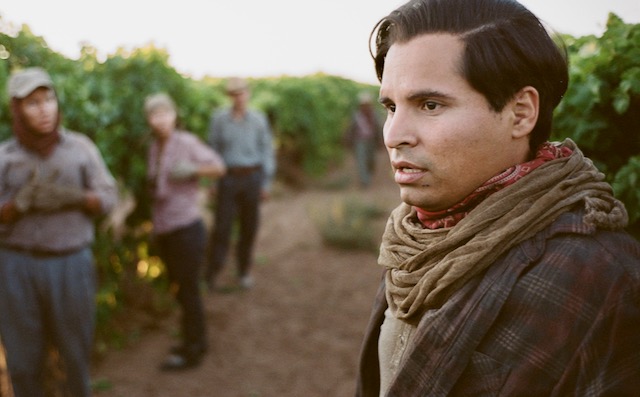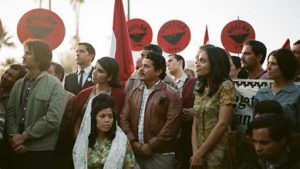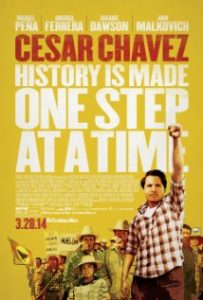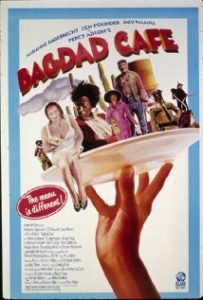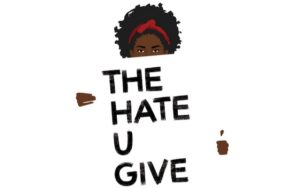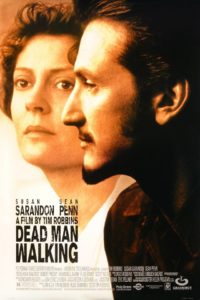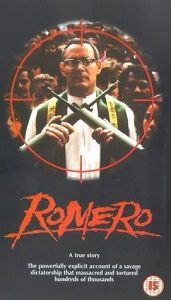April 7, 5th Sunday in Lent
Cesar Chavez
You have heard that it was said, ‘An eye for an eye and a tooth for a tooth.’ But I say to you, Do not resist an evildoer. But if anyone strikes you on the right cheek, turn the other also; and if anyone wants to sue you and take your coat, give your cloak as well; and if anyone forces you to go one mile, go also the second mile.
Matthew 5:38-41
The subject of this film was a remarkable Spanish American who in the 1960s led the California campaign for justice for Spanish and Filipino American grape pickers. Before assuming leadership, Cesar Chavez worked in the fields as a low paid laborer so he would know firsthand the people for whom he was fighting. He faced intense opposition from grape growers and powerful politicians such as Gov. Ronald Reagan. Although he had had to drop out of school so that his mother could leave the fields, this lack of formal education did not hold him back, no more than the disappointments and failures that beset his movement at times. He learned from wise teachers as he grew older. One was a Catholic priest in San Jose named Father Donald McDonnell who introduced him to the writings of St. Francis and Mahatma Gandhi. His wife Helen and fellow activist Dolores Huerta also became his teachers, educating him out of his patriarchal culture. He used the nationwide boycott of grapes to force the growers to negotiate with him, and always sought to keep his movement nonviolent. At one point he went on a health-debilitating fast to force some unruly followers to set aside violence. A deeply devout Roman Catholic, he said, “It is possible to become discouraged about the injustice we see everywhere. But God did not promise us that the world would be humane and just. He gives us the gift of life and allows us to choose the way we will use our limited time on earth. It is an awesome opportunity.” Chavez seized the opportunity when he called on all of America, and then England as well, to stop eating grapes until the powerful growers agreed to pay decent wages to those who picked the fruit. The activist has earned his status as a 20th century prophet who saw far beyond his current struggles: “Once social change begins, it cannot be reversed. You cannot uneducate the person who has learned to read. You cannot humiliate the person who feels pride. You cannot oppress the people who are not afraid anymore. We have seen the future, and the future is ours.”
This “Martin Luther King, Jr. of Hispanics” has left us a precious heritage of faith and justice. On the Sundays when we approach the Lord’s Table and drink of the fruit of the vine, may we think of those who harvest the grapes and for whose betterment the great grape boycotter devoted his life. As we approach the awesome events of Good Friday and Easter, may we reflect especially the meaning of these words for our own lives: “He (God) gives us the gift of life and allows us to choose the way we will use our limited time on earth. It is an awesome opportunity.” Yes, it is.
A guide for this film is in the April 2014 issue of Visual Parables.
April 8
Bagdad Café
There was nothing attractive about him,
nothing to cause us to take a second look.
Isaiah 53:2b
I have said these things to you so that my joy may be in you, and that your joy may be complete.
When I first showed this film a woman in our group exclaimed that she didn’t want to see a film in which “a fat German woman” was one of the main characters. However, as the visual parable of grace about a German tourist named Jasmine and African American motel/café owner Brenda unfolded, the group soon warmed to this gentle soul. Following a quarrel with her loutish husband in the middle of the Mohave Desert, Jasmine is stranded with just a suitcase and her purse and passport. When she trudges up to the run-down Bagdad Café, proprietor Brenda is suspicious due to her lack of a vehicle. Maybe she is a drug dealer or something. Although reluctantly giving her a room, Brenda reports her visitor to the sheriff, who finds no grounds for suspicion. Brenda remains hostile because she discovers that her guest’s suitcase contains men’s clothing. How odd! Jasmine had grabbed the wrong one when parting from her husband. It also contained a magic kit bought for a boy back in Germany, so Jasmine spends her leisure hours practicing magic tricks. She also befriends Brenda’s teenage son and daughter about whom Brenda is always complaining. The overworked proprietor’s lazy husband has been banished, and the two teenagers are of no help running the establishment. Not that business is booming, most truckers avoiding it except when they needed gas. However, as Jasmine’s gentle ways wear down Brenda’s hostility and wins the eager friendship of the teenagers, the Bagdad Café begins to change. Jasmine helps in waitressing while performing clever magic tricks. Word spreads, and soon the Café is filled with truck drivers eagerly cheering on the act, which now includes Brenda singing to the accompaniment of her talented pianist son. All is going well, until the sheriff shows up with the bad news that Jasmine has overstayed her visa and must leave. Soon the crowds fade, one would-be patron looking in at the deserted dining room and saying, “The magic has gone.” However, this Good Friday feeling gives way to one like Easter when one day a taxi stops at the Café and Jasmine steps out, appropriately dressed in white clothing. Brenda embraces her warmly.
This amusing but inspiring parable carries the Biblical message that hostility can be overcome by gentle good will, that enemies can become friends. And that grace, as Isaiah reminds us, can come in unattractive packages— “There was nothing attractive about him (her), nothing to cause us to take a second look.” May we always be open to the unlikely persons who could be grace bearers in our lives, if we but give them the chance. And that the end of faith, despite the Good Friday episodes in our lives, is joy. Joy similar to the reunion of dear friends separated for too long a time.
A guide for this film is in my book Jesus Christ: Movie Star.
April 9
Empire of the Sun
But he was wounded for our transgressions, he was bruised for our iniquities: the chastisement of our peace was upon him; and with his stripes we are healed.
Isaiah 53:5 (KJV)
Then Pilate took Jesus and had him flogged.
John 19:1
In this WW 2-era film young Jim Graham is separated from his fleeing British parents as Japanese soldiers take over Shanghai. He later is captured and sent to an internment camp where he becomes, mascot-like, the favorite of some of the prisoners. He learns that stealing is the way to survive. One night late in the war he hears planes and bombs falling on the docks. Flames light up the sky. He also hears glass breaking, one of the head guards Sergeant Nagata angrily smashing dorm windows. Jim fears reprisals on the sick patients at the camp infirmary, so he runs out into the night. Meanwhile at the clinic Doctor Rawlings is ordering the nurses to move the patients away from the windows. Nagata, his rod in hand, approaches. The doctor blocks his way and the two grapple with each other. The guard starts beating the doctor as Jim rushes onto the porch and breaks the window, thus distracting Nagata. Saying in Japanese to stop beating the man, Jim bows down at the guard’s feet. He exposes his back to the rod, expecting to be beaten himself. Nagata pauses, staring at the boy, and then abruptly walks away. The relieved doctor is so grateful that he gives the boy a pair of fancy golf shoes taken from a dead patient.
Jim’s intervention might be called Gandhian, or even unconsciously modeled after the suffering servant of Isiah 53 who was “wounded for our transgressions.”. The boy was willing to absorb the blows meant for the doctor because he knew how important Rawlings was to the camp. This willingness to accept suffering is at the heart of the gospel—both in our understanding of Christ going to the cross and his teaching about reacting to hostile acts by turning the other cheek. As a prisoner Jim could not have stopped Nagata’s brutal beating of Rawlings by force, even were he a fully-grown man. The only power he had was that of surprise, which consisted of his breaking the window to catch the guard’s attention, and then his kneeling, thereby exposing his back to show his willingness to receive the angry guard’s blow. “Beat someone, if you must,” his action says, “but let it be me and not the doctor responsible for the care of so many men of this camp.” At the moment Jim’s motive was more utilitarian than loving, but when Jesus commands that we act to hostility in a nonviolent way, he does include love, making nonviolence a very powerful force. A good example of this is related in the March 12 meditation celebrating Army trainee Desmond Doss’s literally turning the other cheek when hit by a fellow soldier. As we examine our discipleship during this Lenten season, may we rededicate ourselves to Christ’s way of nonviolence. It isn’t easy, but it is the way that lessens instead of increasing the hostility of a situation. May we sing with gusto the hymn based on the Prayer of St. Francis, “Make me servants of Your peace:/ Where there is hate, may we sow love;/ Where there is hurt, may we forgive;/ Where there is strife, may we make one.”
A guide for this film is in my WJK book Praying the Movies.
April 10
The Hate U Give
The light shines in the darkness, and the darkness has not overcome it.
John 1:5
Do not be deceived; God is not mocked, for you reap whatever you sow.
But anyone who hates a brother or sister is in the darkness and walks around in the darkness. They do not know where they are going, because the darkness has blinded them.
1 John 2:11 (NIV)
African American teenager Starr Carter is a fictional character, but her story rings true—and it is a good follow up to the stories of nonviolence of Jim Graham and Desmond Doss. (See March 12 and April 9.) 16-year-old Starr narrates the film, telling us she lives in two worlds and is uncomfortable in both. There is the ghetto Starr living in Garden Heights with her (mostly) impoverished friends and the Starr attending the distant Williamson prep school where almost all her friends are pampered children of wealthy whites. Her parents, especially her strict father, are willing to pay for her to attend a school that is both safe and staffed by able teachers. To be acceptable she must behave differently in each group, never speaking ghetto language at school, or talking too sophisticatedly back home. One night at a party of her black friends in Garden Park she reconnects with her best childhood friend Khalil. The two chat for a while until they witness an altercation between a group of guys with guns. At the sound of gunfire, everybody runs out of the house, and Khalil leads Starr to his car. He drives toward her home as they listen to a Tupac song. Khalil points out a famous saying of the late rapper – “The hate u give little infants f—s everybody.” He adds, making an acronym of the sentence, “Meaning what society gives us as youth, it bites them in the ass when we wild out. Get it? T-H-U-G L-I-F-E.” She indicates that she does. Then a siren and blue lights pull them up short, the white cop telling them he is stopping them because Khalil failed to signal when he changed lanes. The youth argues with the cop, and when he reaches for his comb, the cop, fearing it is a gun, shoots him. Starr will have to wrestle with her fear about coming out as witness or to keep silent and play it safe, as well as the climate of hate stirred up by the killing, the hatred rising to storm level when the cop is let off with no penalty, like so many hundreds of others through the years. There are complications for Starr with a black gang to which her father had once belonged and the embedded prejudices of her white girl friends and the ignorance of her white boyfriend. By the end of the film she sees clearly that hate brings about only more violence and hate. Remembering that her father had told her they named her Starr so she would become one by bringing light to a darkened world, she vows to live up to her name.
Being African American, Starr has a more hazardous coming of age than most white youth. Although not religious, her deceased friend Kahlil has taught her a Biblical truth, that hatred is a dead-end street. She has been led, through his interpretation of rapper Tupac to understand that unless we stop hating, the cycle of violence will be endless. This I what we Christians believe Christ has come to earth to do, to overcome hate with love, to see that all lives are precious regardless of their skin color. May we all join the Starrs who seek to bring a little light to the darkness. May we dare to sing, in the words of Miriam Therese Winter, “O for a world where everyone Respects each other’s ways,/ Where love is lived and all is done With justice and with praise.”
April 11
Dead Man Walking
For while we were still weak, at the right time Christ died for the ungodly. Indeed, rarely will anyone die for a righteous person—though perhaps for a good person someone might actually dare to die. But God proves his love for us in that while we still were sinners Christ died for us…
…For all who are led by the Spirit of God are children of God.
Romans 5:6-8; 8:14
This is the true story of grace so radical that it truly is “amazing grace.” Sister Helen Prejean is working with the poor in a New Orleans project when she receives a letter from condemned rapist/murderer Matthew Poncelet. Answering his plea, she visits him and when he insists he is innocent, that his companions raped and killed the teenage couple while he held them down, decides to help get his sentence commuted to life imprisonment. This despite his arrogant and racist attitude. When the petition is denied, she agrees to be Matthew’s spiritual adviser until his execution. She comes under criticism from her family and colleagues at the project. She visits the grieving parents of the girl, Hope. They are at first grateful, but when she reveals she has been visiting Matthew, they are shocked, angrily declaring,” You can’t be the friend of that murderer and of this family, too!” Sister Prejean’s faith in the grace preached above by the apostle Paul that she stands by Matthew, but she insists that he must assume responsibility for what he has. The slippery character apparently thinking he can fool such a seemingly naïve do-gooder, insists that he is innocent and that he is “O.K” with God. She understands his pitiful background of poverty and neglect, but continues to press him, even on the last day of his life, to assume responsibility for what he has done. He continues to deny his guilt. She tells him, “Look at you. Death is looking down your neck, and you’re playing your little male come-on games.” Almost at the last hour, after he spends time with his family, he breaks down, crying as he admits that he too raped the girl and killed them both. The nun comforts the broken man, telling him, “You are a son of God.” He tearfully replies,” Thank you. I’ve never been called a son of God before.” With a slight laugh he continues, “I’ve been called a son of a you-know-what plenty of times, but I’ve never been called a son of God.” Agreeing to walk with him to the death chamber, Sister Prejean accompanies him on his “dead man’s walk” down the corridor. From the death chamber Matthew speaks some words of love and concern to the four parents gathered there. Through the glass window he keeps his eyes focused on the nun because a few minutes before she had said to him, “I want the last face you see in this world to be the face of love, so you look at me when they do this thing. I’ll be the face of love for you.” Had he been able he might have sung John Newton’s words, “Twas grace that taught my heart to fear, / And grace my fears relieved;/ How precious did that grace appear/ The hour I first believed!
A guide for this film is in my book Films & Faith: Forty Discussion Guides.
The following two reflections will be posted soon.
April 12
The War
You have heard that it was said, ‘An eye for an eye and a tooth for a tooth.’ But I say to you, Do not resist an evildoer. But if anyone strikes you on the right cheek, turn the other also; and if anyone wants to sue you and take your coat, give your cloak as well; and if anyone forces you to go one mile, go also the second mile. Give to everyone who begs from you, and do not refuse anyone who wants to borrow from you. “You have heard that it was said, ‘You shall love your neighbor and hate your enemy.’ But I say to you, Love your enemies and pray for those who persecute you, so that you may be children of your Father in heaven; for he makes his sun rise on the evil and on the good, and sends rain on the righteous and on the unrighteous. For if you love those who love you, what reward do you have? Do not even the tax collectors do the same?
Matthew 5:38-46
Compared to the thousands of movies that glorify violence, there are but a handful that present an alternative, such as the nonviolent resistance taught by Gandhi and Martin Luther King, Jr. We have already included several (Gandhi; Hacksaw Ridge; Grand Canyon; Babe: Pig in the City; To Kill a Mockingbird; and The Long Walk Home), and here is one more, the story of a Mississippi family dealing with the father’s PTSD symptoms, poverty, and racism. Stephen Simmons is Vietnam vet who finds it difficult to keep a job because of his PTSD, while also trying to teach is adolescent children Stu and Lidia not to fight against the violent Lipnicki children whose father owns a junkyard. Stephen and Stu are at the county fair when the father leaves the son to look for cotton candy to take home for his wife and daughter. The Lipnicki brood spot Stu, surround him, and start fighting. Stephen returns holding two cotton candies and stops the fight, telling the attackers and the gathered crowd to move. Little Billy Lipnicki and his sister follow the father and son to their car. They yell insults as they go. Stu is boiling mad. Stephen tells him to wait while he walks toward the taunters. The two pull back in fear, expecting the worst as Stephen confronts them. Without a word he hands them the cotton candy. Bewildered, the two lick at the unexpected gift as they stare at him. Back at the car the angry Stu says, “I hope you know them’s the kids who just beat me up.” His father replies, “I know who they are son.” “Then why’d you give them Ma and Lidia’s cotton candy?” “Because they look like that hadn’t been given anything in a long time.”
It will take Stu a while before he can understand his father’s kind act or the teachings of Christ which it is based on. He is as confused as are the two taunting Lipnicki’s by Stephen’s unexpected act of kindness. Gandhi and other students of nonviolence have pointed out that unexpected kindness in reaction to hostility throws the attacker off balance. The attacker expects to be attacked in turn, and when the would-b victim does not, the chain of hostility is broken. A different, less hostile relationship is made possible. And that eventually is what happens, Stu even rescuing little Billy Lipnicki from drowning. This can happen in our own lives as well when we refuse to try to get even with someone who has injured us by word or deed, and we reach out and try to befriend them instead, When this happens, we might say, inspired by Stephen’s gift of cotton candy, “How
A guide for this film is in my book Films & Faith: Forty Discussion Guides.
April 13
Romero
Learn to do good; seek justice, correct oppression; defend the fatherless, plead fort the widow.
Isaiah 1:1
The true story in this film is of the valiant stand against injustice by Archbishop Oscar Romero in El Salvador during the 70s and 80s. A handful of wealthy families controlled the government and controlled the peasants by secret death squads. Oscar Romero was a conservative scholar who did not think the church should become involved with politics when he first became Archbishop. But as the death squads killed priests as well as peasants, and the Archbishop ventured out among the people and saw their poverty and terror, he changed and began to speak out for justice. His voice was heard over the church’s radio station, millions of the poor taking heart by his assurance that God loved them and was for their cause. His best friend, Fr. Rutilio Grande is murdered along with a couple of peasants, and the Archbishop turns the funeral into a national protest. He loses the support of many of the upper class who had admired him early on but are now upset by his treating the poor as their equals. He also clashes with some of the more radical priests who have given up on nonviolent protest and want to join the armed resistance movement. In one scene he tells a priest holding a gun and about to leave that violence is wrong, whether it comes from the left or the right. The Archbishop seals his fate when he addresses the soldiers over the radio:
I’d like to make an appeal in a special way to the men in the army. Brothers, each one of you is one of us. We are the same People. The farmers and peasants that you kill are your own brothers and sisters. When you hear the words of a man telling you to kill, think instead in the words of God, “Thou shalt not kill!” No soldier is obliged to obey an order contrary to the Law of God. In His name and in the name of our tormented people who have suffered so much, and whose laments cry out to heaven: I implore you! I beg you! I order you! [shouts] Stop the repressions!”
Such bold resistance cannot be tolerated. Soon after a soldier guns him down while the cleric is celebrating mass in a hospital chapel.
Archbishop Romero chose the way of the cross despite the danger. He died for justice, but his enemies’ victory was short-lived. Today they are seen as the criminals they were, despite their wealthy status and power, and it is Oscar Romero who has been declared by the Catholic Church a saint. Romero was like his Lord who boldly entered Jerusalem, not mounted on the symbol of power, but on a humble donkey, symbol of nonviolence and service. May he continue to inspire us to live up to the teachings of Christ in our less dramatic, but still important, pilgrimage of discipleship. There are injustices calling for redress in our own country. Some are national in scope, many are local. Homeless people, hungry children. Immigrants insulted and rejected by some of our neighbors. Each of us is called; may all of us respond in our unique way.
There is a much longer meditation based on this film in my WJK book PRAYING THE MOVIES, Daily Meditations from Classic Films and a guide in FILMS AND FAITH: Forty Discussion Guides.
